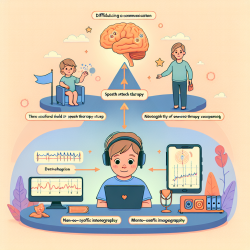Introduction
In the quest to enhance cognitive performance and mental states, the research article "Walking and Sitting Outdoors: Which Is Better for Cognitive Performance and Mental States?" provides insightful data-driven evidence. This study, published in the International Journal of Environmental Research and Public Health, explores the impact of outdoor environments combined with physical activity on cognitive function. As practitioners dedicated to improving outcomes for children, understanding and implementing these findings can be transformative.
Key Findings
The study involved 50 participants who were divided into two groups: one engaged in walking, while the other remained seated in an outdoor environment. Cognitive performance was assessed using EEG and cognitive tasks before, during, and after the intervention. Key findings include:
- Both walking and sitting outdoors led to improvements in cognitive performance, with no significant difference between the two groups.
- Relaxation during the intervention was the best predictor of post-test performance.
- Participants with a higher connection to nature and state-based mindfulness reported lower levels of frontal theta, indicating reduced rumination.
- The walking group demonstrated higher relaxation levels.
Implications for Practitioners
For speech-language pathologists and educators, these findings underscore the potential benefits of incorporating short outdoor interventions into therapy and educational settings. Here are some practical applications:
- Incorporate Outdoor Sessions: Consider scheduling brief outdoor sessions where children can either walk or sit in a natural setting. This can be a part of therapy or a break during learning activities.
- Promote Mindfulness: Encourage mindfulness practices during these outdoor sessions to enhance relaxation and cognitive benefits.
- Foster a Connection to Nature: Help children develop a connection to nature, which can improve their overall mental states and cognitive performance.
Encouraging Further Research
While this study provides valuable insights, further research is necessary to explore the long-term effects and potential applications in diverse populations. Practitioners are encouraged to engage in or support research initiatives that delve deeper into the intersection of natural environments, physical activity, and cognitive performance.
Conclusion
Incorporating outdoor interventions into therapy and educational practices can offer significant cognitive and mental health benefits. By leveraging the natural environment, practitioners can enhance the effectiveness of their interventions, ultimately leading to better outcomes for children. To delve deeper into the research findings, read the original research paper: Walking and Sitting Outdoors: Which Is Better for Cognitive Performance and Mental States?










